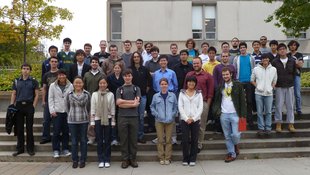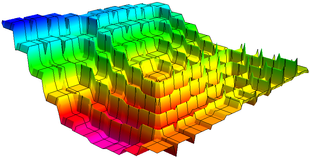10-327/Homework Assignment 8
| ||||||||||||||||||||||||||||||||||||||||||||||||||||||||||||
Change in Plans
Time to rest, a bit. For the lack of fun questions, I've decided to postpone this assignment a bit, and to cancel assignment number 9. So this assignment will only be written on Monday November 29, and will be due on the following Monday, December 6.
Reading
Read sections 35, 43, and 45 in Munkres' textbook (Topology, 2nd edition). Remember that reading math isn't like reading a novel! If you read a novel and miss a few details most likely you'll still understand the novel. But if you miss a few details in a math text, often you'll miss everything that follows. So reading math takes reading and rereading and rerereading and a lot of thought about what you've read. Also, preread section 48 and 49, just to get a feel for the future. For fun alone, read also section 44.
Doing
Solve and submit the following problems from Munkres' book:
- Problems 2, 5a on pages 223-224.
- Problems 1, 4, 5 on page 270 (the relevant material will be covered on Thursday December 2).
- Problem 1 on page 280 (same comment).
In addition, solve and submit the following problem:
Problem IX. Show that every metric space can be embedded in the cube .
Hint. Given a point , what real-valued function on immediately comes to mind?
Due date
This assignment is due at the end of class on Wednesday, December 8, 2010.
| Dror's notes above / Student's notes below |
Discussion
- Then how do we count the homework in the final grade? I remember the old rule is to select the best 7 assignments from the total of 9. - Jolin
- The rule was "worst two assignments will not count", see 10-327/About This Class. Drorbn 05:40, 27 November 2010 (EST)
Question. For question 4. It is to show the intersection is nonempty by creating a Cauchy sequence from these A_n's. But I can't think of a way to prove the other direction. Are we supposed to create a nested sequence of closed sets for every Cauchy sequence? Then how do we ensure closeness? -Kai
Take the closure of each set, as your set. -Jdw Yea thanks Jason. It works because the diam of the closure of a set is the same as the set in the metric topology. -Kai

![{\displaystyle [0,1]}](https://wikimedia.org/api/rest_v1/media/math/render/svg/738f7d23bb2d9642bab520020873cccbef49768d)






